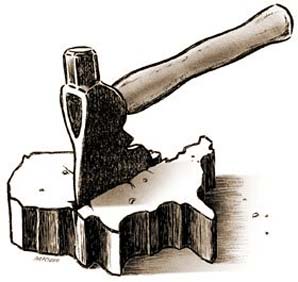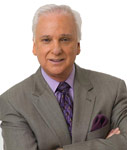
That's like giving ammo to the enemy. Besides, in media circles, where people make a good living dividing Americans, seeing the other guy's point of view is bad for business.
When he first ran for president, Barack Obama promised to unify us. You remember what he said about no Red America or Blue America, just a United States of America.
Instead we got the most polarizing president since Lincoln. I don't know anybody who's lukewarm on Mr. Obama. Liberals adore him — or at least have adored him for most of his presidency.
And conservatives don't simply disagree with him; many detest him. If he were caught on video robbing a bank, liberals would find an excuse to exonerate him. "He was just withdrawing money he had deposited, but the bank was closed. What was he supposed to do?"
And if he found a cure for cancer, conservatives would condemn him for not finding it sooner. "If he didn't play so much golf, he'd have found a cure years ago which would have saved the lives of many little children."
Which brings us to Ferguson, Missouri. Nobody knows what actually happened there, except for the police officer involved — and we haven't heard from him. Was he justified in shooting an unarmed kid 6 times or did he panic and overreact to some imaginary threat? We don't know.
But in a polarized America, everybody is an expert. And everybody must take sides. To sit on the sidelines and wait for the facts to come in is a sign of weakness. Warriors don't sit on the sideline — ever.
So if you're a liberal who gets what passes for news from MSNBC you know what happened: The racist white cop shot the black kid because he's a racist white cop.
And if you're a conservative who gets the lowdown from Fox, you're pretty sure the cop is getting railroaded. Didn't Michael Brown bust the cop in the face and fracture his eye socket? That's what Fox News reported, initially getting its information from a conservative website. The report may be true — or not. But so far no one in authority has confirmed the story. But if you play right field, you're hoping the story is true because that would confirm what you always knew — that the cop was right and the kid was wrong.
On MSNBC, we get contributor Michelle Bernard, a black woman, telling us that what happened in Ferguson amounts to a "war on black boys" that could turn into "genocide." We get nothing from her about the inconvenient fact that black boys are far more likely to be killed by other black boys than by white cops.
Liberals condemn abusive cops — especially when young black males are involved. Conservatives say the problem isn't racism, but dysfunction in too many black communities.
I've been a reporter long enough to know that there are bad cops out there. And some are racist bad cops. I've also seen dysfunction in too many black neighborhoods. But both sides have a problem in polarized America acknowledging that the other side might have a point.
And on TV or talk radio or on the Web, it's simply bad business to see more than one side. People turn to partisan media to get their own biases validated. They don't want to hear the other side. That might require them to consider some arguments they'd rather not consider.
When the police in Ferguson released the video of Michael Brown stealing some cigars and roughing up the convenient storeowner, liberals said it was a "smear." Conservatives said — correctly, in my view — that a kid who had just committed a crime might also go after a cop he thought was on to him.
We don't know. None of this is a case for wishy-washy even-handedness. We all have deeply held opinions based on our values. There's nothing wrong with that. But sometimes, especially when we don't know the facts, it might be a good idea to keep an open mind. Maybe that cop was one of the bad ones. Who knows? Maybe the kid was a thug who after stealing the cigars instigated a confrontation with the cop that turned deadly. Could be. Hanging on to deeply held principles is one thing. Circling the wagons to protect your side, and your preconceived notions — ahead of the facts — is something else altogether.
Comment by clicking here.

JWR contributor Bernard Goldberg, the television news reporter and author of several bestselling books, among them, Bias, a New York Times number one bestseller about how the media distort the news. He is widely seen as one of the most original writers and thinkers in broadcast journalism. Mr. Goldberg covered stories all over the world for CBS News and has won 10 Emmy awards for excellence in journalism. He now reports for the widely acclaimed HBO broadcast Real Sports.
He is a graduate of Rutgers University, New Brunswick, New Jersey and a member of the school's Hall of Distinguished Alumni and proprietor of BernardGoldberg.com.


 Contact The Editor
Contact The Editor
 Articles By This Author
Articles By This Author